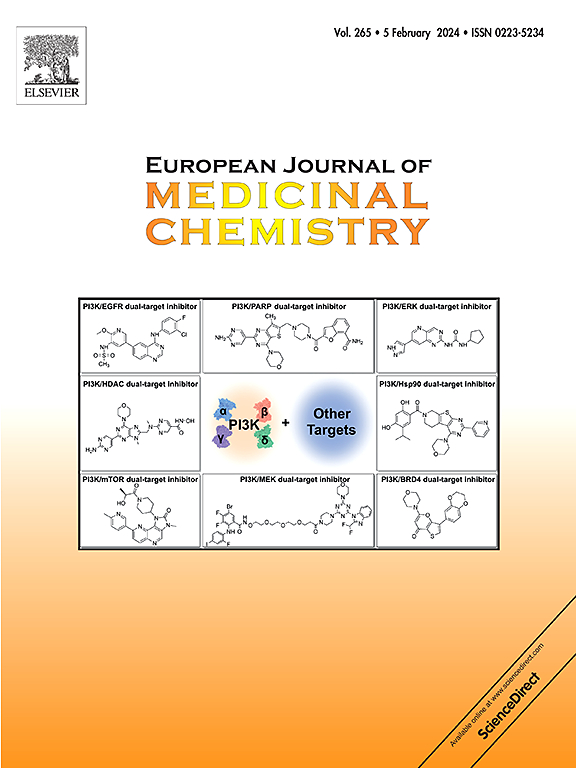SA-8作为一种有效的SHP2-AUTAC降解剂在癌症治疗中的发现
IF 6
2区 医学
Q1 CHEMISTRY, MEDICINAL
引用次数: 0
摘要
Src同源区2-containing phosphatase 2 (SHP2)在多种癌症中过表达,通过调节细胞内信号通路抑制免疫功能,同时促进肿瘤免疫逃逸。目前,针对SHP2的主要治疗策略集中在抑制其催化活性或降低其表达水平。然而,SHP2变构抑制剂作为单药使用时,在疗效、安全性和发育困难方面面临挑战。因此,已经开发了几种SHP2-PROTAC分子。鉴于泛素-蛋白酶体系统的底物谱有限,我们提出基于自噬的降解策略具有更大的优势。以SHP099作为目标蛋白(POI)的配体,设计并合成了两个系列的SHP2-AUTACs。其中,SA-8的生物活性最优,具有显著的抗肿瘤活性和较强的SHP2降解能力。机制研究表明,SA-8通过与SHP2和LC3形成三元配合物诱导SHP2降解,最终激活自噬-溶酶体途径。发现SA-8能剂量依赖性地诱导HeLa细胞凋亡。这项工作不仅验证了AUTAC策略的实际效用,而且为开发下一代目标降解剂提供了一种有前途的治疗方法。本文章由计算机程序翻译,如有差异,请以英文原文为准。

Discovery of SA-8 as a potent SHP2-AUTAC degrader in cancer therapy
Src homology region 2-containing phosphatase 2 (SHP2) is overexpressed in various cancers and suppresses immune function while promoting tumor immune escape by regulating intracellular signaling pathways. Currently, the primary therapeutic strategies targeting SHP2 focus on inhibiting its catalytic activity or reducing its expression levels. However, SHP2 allosteric inhibitors face challenges in terms of efficacy, safety, and developmental difficulty when used as monotherapy. Consequently, several SHP2-PROTAC molecules have been developed. Given the limited substrate spectrum of ubiquitin-proteasome systems, we propose that autophagy-based degradation strategies possess greater advantages. Using SHP099 as the ligand of the protein of interest (POI), we designed and synthesized two series of SHP2-AUTACs. Among these, SA-8 demonstrated the optimal biological activity, showing significant antitumor activity and potent SHP2 degradation capability. Mechanistic studies revealed that SA-8 induced SHP2 degradation through ternary complex formation with both SHP2 and LC3, ultimately activating the autophagy-lysosome pathway. It was found that SA-8 can dose-dependently induce apoptosis in HeLa cells. This work not only validates the practical utility of the AUTAC strategy but also offers a promising therapeutic approach for developing next-generation target degraders.
求助全文
通过发布文献求助,成功后即可免费获取论文全文。
去求助
来源期刊
CiteScore
11.70
自引率
9.00%
发文量
863
审稿时长
29 days
期刊介绍:
The European Journal of Medicinal Chemistry is a global journal that publishes studies on all aspects of medicinal chemistry. It provides a medium for publication of original papers and also welcomes critical review papers.
A typical paper would report on the organic synthesis, characterization and pharmacological evaluation of compounds. Other topics of interest are drug design, QSAR, molecular modeling, drug-receptor interactions, molecular aspects of drug metabolism, prodrug synthesis and drug targeting. The journal expects manuscripts to present the rational for a study, provide insight into the design of compounds or understanding of mechanism, or clarify the targets.

 求助内容:
求助内容: 应助结果提醒方式:
应助结果提醒方式:


